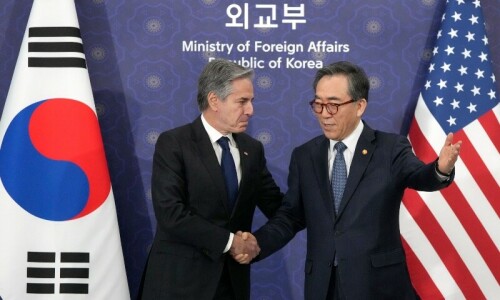FREETOWN: West Africa was counting the cost of measures to contain the deadly Ebola epidemic on Sunday, as unprecedented restrictions caused snarled transport, food shortages and soaring prices.
“We are trying to cope,” said Joseph Kelfalah, the mayor of Kenema, an eastern district of Sierra Leone that is under strict quarantine along with nearby Kailahun, but he added food prices were “escalating”.
Tribal authorities are imposing huge fines for failure to report cases of Ebola, which has claimed nearly 1,000 lives in west Africa in the worst outbreak in four decades.
Under the country’s “Operation Octopus”, some 1,500 soldiers and police have been deployed to enforce the quarantines, turning people away at checkpoints and accompanying health workers searching for people who may have contracted the virus.
“Only essential officials and food items are being allowed in after intensive searches,” deputy police chief Karrow Kamara said.
Sierra Leone, Liberia and Guinea are the countries hardest hit by the epidemic, which the UN World Health Organisation has called an international health emergency.
Liberia has been particularly affected by food shortages since declaring its state of emergency on Wednesday. It, too, has deployed soldiers to restrict movement, notably from the worst-affected northern provinces to the capital Monrovia.
Sando Johnson, a senator in the province of Bomi, northwest of Monrovia, said the restrictions were “severe” and warned people would die of starvation if they are not relaxed.
“My county has been completely quarantined because soldiers don’t allow anyone to get out of the area and they don’t allow anyone to go there,” he said.
Published in Dawn, August 11th, 2014










































Dear visitor, the comments section is undergoing an overhaul and will return soon.